Key Highlights
- Amazon B2B connects sellers with institutional buyers, including Fortune 100 companies, schools, and government agencies, enabling larger order volumes and repeat procurement cycles.
- No extra fee to sell B2B on Amazon, beyond the $39.99 Professional plan, making it a low-barrier, high-reward channel for bulk sellers.
- Sellers can offer exclusive business pricing and quantity discounts, customize quotes, and build business profiles to attract high-value buyers.
- Tools like Helium 10, SellerApp, and Feedvisor enhance performance, helping sellers optimize listings, track buyer trends, and automate pricing at scale.
- Built-in analytics dashboards track B2B vs. B2C sales, helping sellers measure business performance and tailor strategies for bulk orders and buyer loyalty.
- Business Prime and tax exemption tools simplify procurement for buyers, increasing conversion rates and long-term account value for B2B sellers.
- beBOLD Digital helps brands scale B2B on Amazon, offering expert support in strategy, automation, and channel growth for serious wholesale expansion.
In today’s fast-paced procurement landscape, B2B on Amazon is reshaping how organizations buy and sell at scale. In 2022, Amazon Business achieved a gross merchandise volume (GMV) of $41.5 billion, and that figure is expected to nearly double to $83 billion by 2025 (Statista). This explosive growth underscores the platform’s power to connect suppliers with high-volume buyers, streamline purchasing workflows, and unlock new revenue streams.
Let's demystify the core mechanics of selling B2B on Amazon, highlight its unique features, and provide tools to help your business thrive in this booming marketplace.
What Is Amazon B2B (Amazon Business)?
Amazon B2B, officially known as Amazon Business, is a specialized B2B Amazon marketplace designed for business buyers rather than individual consumers. Unlike the standard Amazon store, Amazon Business provides a tailored shopping experience with features built for bulk purchasing, tax-exempt buying, and multi-user accounts.
It serves a wide range of customers, including:
- Companies and wholesalers buying in larger quantities.
- Government agencies and public sector organizations.
- Educational and healthcare institutions.
Curious whether wholesale or direct selling suits your Amazon B2B strategy? Explore the key differences here.
Buyer Programs vs. Seller Programs
Amazon B2B supports two core user types: Business Buyers and Professional Sellers. Each has access to features designed to streamline their side of the transaction.
|
Feature Category |
Buyers Program (Business Accounts) |
Seller Program (Amazon Business Sellers) |
|
Platform Access |
Amazon Business portal |
Amazon Seller Central (Professional Selling Plan) |
|
User Management |
Multi-user accounts with role-based permissions |
Managed by individual seller or brand |
|
Procurement Tools |
Approval workflows, PO management, and invoicing options |
Pricing tools, tax settings, shipping configuration |
|
Exclusive Features |
Business-only pricing, quantity discounts, and tax exemptions |
Business pricing, quantity discounts, and certification badges |
|
Target Users |
Companies, institutions, and government agencies |
Wholesalers, brands, and B2B-focused ecommerce sellers |
|
Marketing Tools |
N/A |
Tools for Amazon SEO, email marketing, and customer segmentation |
|
Customer Service Focus |
Streamlined support for business purchases |
Enhanced visibility and support for Amazon Business customers |
Is Amazon Business Worth It?
Yes, Amazon Business continues to gain traction among both buyers and sellers, becoming a key player in the evolving B2B ecommerce landscape.
With more companies shifting to digital procurement and online selling, the platform offers a streamlined way to connect business needs with reliable supply. For organizations aiming to scale or modernize operations, Amazon Business presents a relevant and timely solution in today’s competitive market.
Core Benefits of Amazon B2B Marketplace

The Amazon Business B2B platform is designed to streamline how companies buy and sell in bulk. Whether you're a buyer managing procurement or a seller scaling B2B operations, the Amazon B2B business model offers a powerful set of features tailored for modern business commerce. Here's a quick look at what sets the Amazon B2B marketplace apart:
- Bulk Pricing & Quantity Discounts: Sellers can offer business prices and tiered volume discounts to attract large orders and repeat business. This pricing flexibility supports high-volume transactions, making it easier to compete in the B2B supply Amazon ecosystem.
- Business-Only Features: Buyers gain access to exclusive tools, like tax-exempt purchasing, purchase order numbers, and curated catalogs that align with internal policies, streamlining the entire buying process.
- Procurement Tools & Analytics: With tools like B2B Product Opportunity reports and industry performance dashboards, sellers can identify demand trends, optimize listings, and enhance visibility on the platform.
- Scalability & High-Value Customers: The platform connects sellers to high-impact buyers, including Fortune 100 companies, educational institutions, healthcare providers, and government bodies. With global availability across the US, UK, India, Australia, and more, the Amazon B2B marketplace is built for scalable growth.
Want to make smarter business decisions on Amazon? Learn how to read and analyze your reports with our Amazon sales report guide.
Seller Requirements & Getting Started
Before you can tap into the growing demand from Amazon Business customers, it’s essential to understand what's required to join the Amazon B2B marketplace. Below, we’ll walk you through everything you need, from meeting the initial criteria to enrolling and listing your products.
Who Can Sell on Amazon Business?

If you're wondering how to sell on Amazon B2B, the first step is meeting the platform's eligibility requirements. Amazon Business is open to qualified sellers who meet certain criteria to ensure a reliable and professional buyer experience.
To sell on Amazon Business, you must have:
- A Professional Seller account on Amazon Seller Central.
- Strong account health metrics, including low order defect, cancellation, and late shipment rates.
- Valid business documentation, such as VAT registration, tax information, or business licenses (requirements vary by country).
- Compliance with Amazon's B2B policies, including invoicing and customer service standards.
Costs and Fees Explained
Selling on Amazon Business (B2B Amazon) does not come with any additional platform fees beyond what standard sellers already pay. Here’s a quick breakdown of the typical costs involved:
- $39.99/month subscription fees for a Professional Seller account (required to access Amazon Business features).
- Referral fees, which vary by category (usually 6%–15% of the item price). Check out the complete breakdown here.
- Optional costs for advertising, Amazon SEO tools, or premium features like Business Prime.
- Fulfillment fees if using Fulfillment by Amazon (FBA), based on item size, weight, and shipping speed.
There are no extra charges to enroll in the Amazon B2B marketplace, making it a cost-effective way to expand into wholesale and institutional sales channels.
Unsure how taxes work when selling B2B on Amazon? Don’t miss our comprehensive Amazon FBA taxes guide to stay compliant and avoid costly surprises.
Enrollment Process
Getting started with B2B on Amazon is straightforward. Follow these five steps to unlock access to high-volume business buyers:
Step 1: Sign Up for a Professional Seller Account

To sell on Amazon Business, you must have a Professional Seller account (Individual plans aren’t eligible). Click here to sign up.
Step 2: Apply to Become an Amazon Business Seller

Once logged into Seller Central, here's what you need to do next:
Step 2: Go to Settings and click on Account Info.
Step 3: Under Your Services, select Manage.
Step 4: Enable “Sell as an Amazon Business Seller.”
Step 5: Submit your registration for Amazon’s review.
Step 3: Decide What You Will Sell

Focus on high-demand, low-competition products often purchased in bulk, such as categories like Office Products, Industrial & Scientific, and Tools & Home Improvement, are ideal for Amazon B2B.
Step 4: Set Up Your Business Profile

Create a compelling Business Profile that highlights your B2B advantages, such as bulk pricing, invoice terms, and certifications, to attract and convert Amazon Business customers.
Step 5: Start Selling

List your products as usual through Seller Central. With your account now B2B-enabled, you'll reach more business buyers and grow your presence in the Amazon B2B marketplace.
Unique Features of the Amazon Business Sellers Program

Selling through B2B on Amazon doesn’t just connect you to high-value buyers; it also equips you with specialized tools to grow, manage, and optimize your business operations. Here are some key features that make the Amazon Business Sellers Program stand out:
1. Business Pricing
Display separate prices for business and retail customers. Business buyers see exclusive lower rates, helping you attract bulk orders while maintaining profitability. Consumer prices can’t exceed business prices, ensuring fairness across both segments.
2. Quantity Discounts
Offer up to five pre-set pricing tiers to support bulk buying, with no need for custom quotes for every order. This streamlines high-volume transactions and encourages repeat purchases from business buyers.
3. Reporting Dashboards
Access B2B Central, a suite of analytics tools including:
- Sales Snapshot (B2B vs. B2C performance)
- Performance by Industry (track revenue by sector)
- Top Products (identify best-sellers)
- Business Action Center (actionable suggestions from Amazon)
New to B2B on Amazon? Learn how to navigate your Seller Central more effectively with our beginner’s guide to the Amazon Seller Dashboard.
4. Business Profile
Build credibility with a customized profile featuring your logo, business type, founding year, and more. This appears on product pages and offer listings, helping B2B buyers trust and recognize your brand.
5. Enhanced Product Content
Provide detailed, B2B-relevant information, like CAD files, spec sheets, installation manuals, and comparison charts, making it easier for decision-makers to evaluate your products.
6. Quote Requests
Respond to custom bulk quote requests through your B2B dashboard. Buyers can request pricing for high-volume purchases, giving you the chance to offer tailored discounts and close larger deals.
7. Certifications
Showcase quality and diversity certifications such as ISO, AS, or Small Business designations (e.g., Minority-, Woman-, or Veteran-Owned). These filters help buyers meet supplier diversity goals and boost your visibility.
8. Tax Exemption Program (ATEP)
Automatically process tax-exempt purchases for eligible buyers, reducing friction for large institutions that require tax-compliant invoicing.
Together, these tools make selling B2B on Amazon more strategic, data-driven, and tailored to the needs of modern business buyers.
Tools for Amazon B2B Sellers
To succeed in B2B on Amazon, sellers must go beyond basic listings and leverage the right tools to optimize performance, automate processes, and scale efficiently. Here are some essential tools across key areas:
Listing Optimization Tools
Here are some essential tools to optimize product listings for better visibility, conversions, and business buyer appeal on Amazon B2B:
1. Helium 10

Offers keyword research, product listing optimization, and market insights tailored to Amazon sellers. The tools of Helium 10 help you tailor listings for both B2C and B2B customers, improving ranking and conversion potential for bulk-focused buyers.
2. Jungle Scout
Ideal for product research and competitive analysis, Jungle Scout helps identify high-demand, low-competition B2B categories. Its listing builder ensures listings are keyword-rich and optimized for institutional buyers.
3. AMZScout

AMZScout's product database and Chrome extension simplify market analysis. It helps identify wholesale-ready products and optimize listings for search visibility and B2B buyer intent.
Using these tools ensures your product listings are search-optimized, professional, and business-ready, key for success on Amazon Business.
Analytics Platforms
Here are three powerful analytics tools to help you track performance, understand buyer behavior, and grow your B2B on Amazon business strategically:
1. B2B Central (Amazon Seller Central)

Amazon’s built-in dashboard provides deep insights into sales volume, repeat purchases, and top-performing B2B SKUs, helping sellers track business-specific growth and identify optimization areas.
2. DataHawk

DataHawk offers analytics on sales performance, SEO, and profitability. Ideal for tracking B2B-specific KPIs like large-order frequency and bulk order conversion rates across Amazon Business.
3. SellerApp

Combines keyword intelligence, performance tracking, and AI-powered insights to enhance visibility and conversions. SellerApp is built to optimize strategy for high-value buyers and institutional purchasing trends.
These platforms give Amazon Business sellers a data-driven edge, helping optimize listings, pricing, and strategy for scalable success.
Automation and AI Solutions
Here are some powerful tools that help automate repetitive tasks, streamline pricing, and improve operational efficiency for B2B on Amazon:
1. Feedvisor

Feedvisor uses AI to automate dynamic pricing, optimize ad spend, and scale operations. Its business intelligence tools are perfect for high-volume B2B sellers focused on profitability and long-term growth.
2. RepricerExpress

Automates competitive pricing based on real-time market data. RepricerExpress is especially useful for Amazon B2B sellers needing to manage large catalogs and maintain a price advantage in bulk deals.
3. Teikametrics

Teikametrics combines automation with machine learning to optimize advertising and pricing. Great for B2B sellers looking to reduce ACoS, scale campaigns, and increase visibility with institutional buyers.
These tools empower Amazon Business sellers to automate and scale efficiently while maintaining control over pricing, performance, and customer experience.
Pros & Cons of Selling on Amazon B2B

Selling on the Amazon B2B marketplace opens up new revenue streams, but like any platform, it comes with both opportunities and challenges. Here's a quick breakdown:
Why Sellers Are Turning to Amazon B2B
If you're considering selling on Amazon B2B, here are some key advantages that can help grow your business and streamline operations:
- Larger Order Sizes: B2B buyers often purchase in bulk, leading to higher average order values.
- Repeat Business: Organizations tend to reorder regularly, creating predictable sales cycles.
- Fewer Returns: Business buyers typically have clearer purchase intent, resulting in lower return rates.
- Improved Visibility: Sellers gain access to high-intent Amazon Business customers and benefit from placement in curated B2B supply Amazon catalogs.
- Simplified Procurement for Buyers: Streamlined buying processes increase trust and retention.
What to Watch Out for When Selling on Amazon B2B
However, like any platform, selling on Amazon Business comes with its own set of challenges sellers should be prepared to manage:
- Strict Performance Standards: Sellers must maintain low defect, cancellation, and late shipment rates to stay competitive.
- Complex Price Management: Handling tiered pricing, volume discounts, and tax-exempt rules can be time-consuming.
- VAT and Invoicing Compliance: Especially for global sellers, navigating country-specific tax and invoicing requirements can add operational overhead.
Despite these challenges, the B2B Amazon business model offers significant long-term potential for sellers focused on growth, efficiency, and enterprise-level customers.
Fuel Your B2B Growth on Amazon with beBOLD Digital
B2B on Amazon is more than just bulk orders; it’s a strategic gateway to enterprise buyers, institutional clients, and recurring revenue. But to truly win in this space, you need more than just a seller account. At beBOLD Digital, we help brands dominate Amazon Business through tailored B2B strategies, listing optimization, and performance-driven automation. Whether you’re launching or scaling, we offer the tools, insights, and execution needed to succeed in this competitive marketplace.
Let’s talk about how we can help you build, optimize, and grow a high-performing Amazon Business channel. Schedule your B2B strategy call now.
Frequently Asked Questions
What is Amazon B2B vs. Amazon Business marketplace?
They’re the same. Amazon B2B refers to Amazon Business, a dedicated platform that enables companies to buy and sell in bulk using business-specific features like multi-user accounts, purchase orders, tax-exempt options, and volume discounts.
How do I set business pricing and quantity discounts?
You can set Business Prices and tiered quantity discounts through Amazon Seller Central by editing individual SKUs or uploading pricing in bulk using inventory feeds for streamlined B2B pricing management.
Who buys on Amazon Business?
Buyers include registered businesses, procurement teams, government agencies, educational institutions, healthcare organizations, and even Fortune 100 companies, all looking for business-only pricing, invoicing, and bulk-order convenience through the Amazon B2B marketplace.
Are the fees different from standard Seller Central?
No, Amazon B2B uses the same Professional Selling Plan at $39.99/month. Referral, FBA, and fulfillment fees still apply, but there are no extra fees to list or sell through Amazon Business.
Can consumer and business customers see different prices?
Yes, you can set separate business-only prices and consumer prices for the same SKU. This allows you to offer volume discounts and exclusive deals to verified Amazon Business customers without affecting your retail pricing.
Does Amazon have a B2B platform?
Yes, Amazon’s B2B platform is called Amazon Business. It offers a specialized buying and selling experience for companies, featuring bulk purchasing, tax exemptions, invoicing, and tools designed for B2B supply chain and procurement efficiency.
What is B2B Prime Amazon?
Amazon Business Prime is a premium membership for business accounts, offering benefits like fast shipping, spend visibility, guided buying, and integration tools. It’s tailored for teams managing procurement at scale, across departments or locations.
Ready to scale your wholesale presence on Amazon? Contact beBOLD Digital today and discover how our tailored strategies can help you succeed in the competitive world of B2B on Amazon.


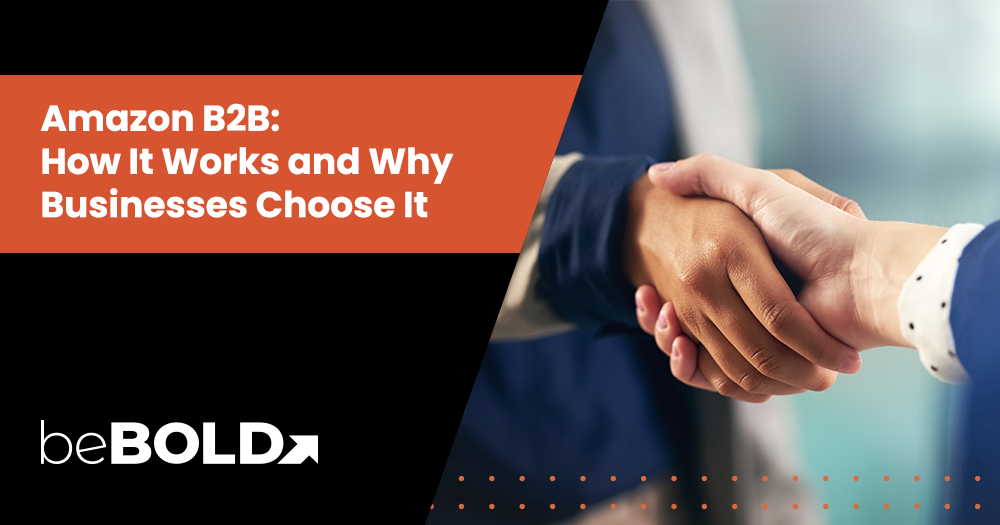

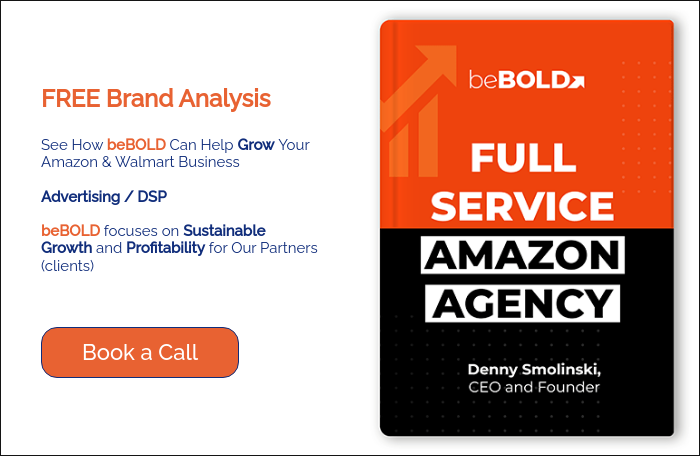


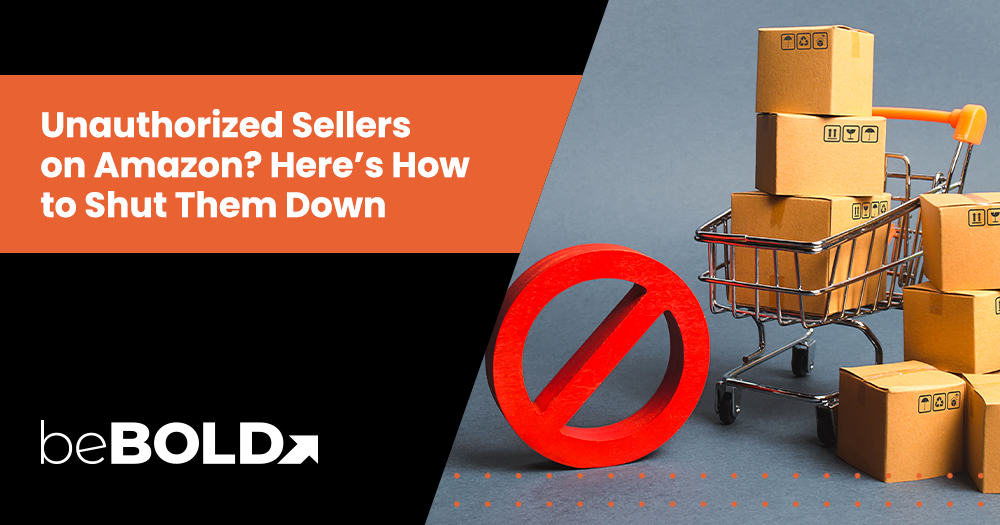
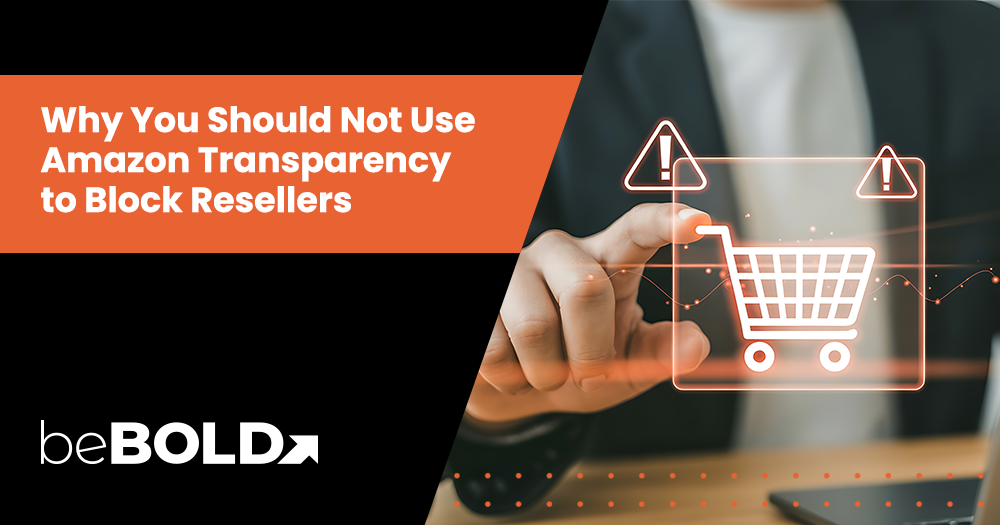
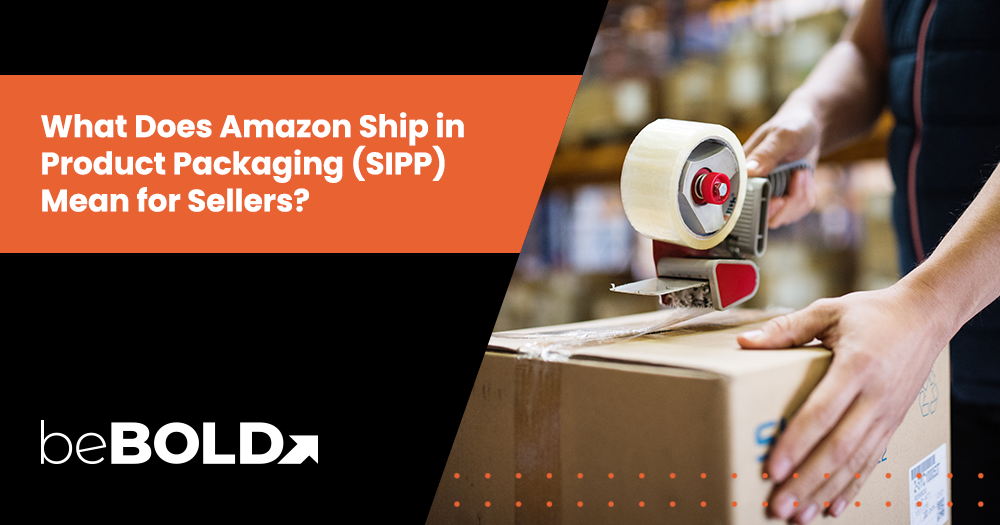
Comments